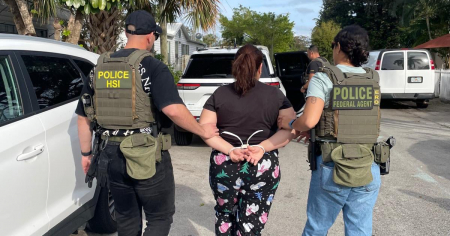The Supreme Court of the United States confirmed this Friday the halt on deportations by the Donald Trump administration under the Foreign Enemies Act, an 18th-century legislation used in times of war.
A statement from the Supreme Court confirms that the order preventing the Trump administration from deporting Venezuelan immigrants under the Alien Enemies Act remains in effect.
At the same time, conservative judges in Texas were instructed that they must provide a hearing for the Venezuelans detained whom the Trump administration wishes to send to prison in El Salvador.
The order reveals that the judges are concerned about the pressure from the Trump administration to expedite deportations and about the unwillingness of some judges to protect the rights to due legal process.
Upon learning of the statement, the president of the U.S. lashed out at the judiciary and accused it of ruling that "the worst murderers, drug traffickers, gang members, and even those who are mentally ill, who have entered our country illegally, cannot be expelled without going through a lengthy, prolonged, and costly legal process."
In Trump's opinion, these people will commit "many crimes before they even see the inside of a courthouse."
"The outcome of this decision will allow more criminals to enter our country, causing significant harm to our beloved American public. It will also encourage other criminals to enter our country illegally, spreading chaos and confusion wherever they go. The Supreme Court of the United States does not allow me to do what I was elected for. Sleepy Joe Biden allowed millions of foreign criminals to enter our country without any 'process,' but to remove them from our country, we have to go through a long and extensive process," he said.
Without due process
On April 7, the Supreme Court ruled that individuals who were expelled under the law must be given proper notice that they were being expelled under that regulation so that they could file a legal challenge.
Less than two weeks later, on April 19, the Supreme Court ordered a halt to the deportation of immigrants in Texas after evidence was presented showing that they were not being given a fair opportunity to present their cases.
The conservative judges Clarence Thomas and Samuel Alito expressed their disagreement with the Supreme Court's decision.
The intervention responded to an emergency motion filed by the American Civil Liberties Union (ACLU), which highlighted attempts by immigration authorities to resume deportations using that law.
"We are deeply relieved. These individuals were at risk of being sent to brutal prisons without having had a fair process," stated Lee Gelernt, an attorney with the ACLU.
The Supreme Court had authorized the U.S. government to apply this old legislation, but it stipulated that those affected must be informed and have a reasonable time to appeal to a court. The attorneys for the detained migrants claim that the government failed to meet those minimum guarantees.
The Foreign Enemies Act
The Foreign Enemies Act was enacted in 1798 and has only been invoked three times in U.S. history. Its most recent use dates back to World War II, when it was used to intern Japanese-American citizens.
In this case, Trump's team has used it to justify the deportation of more than 200 Venezuelans, accused of belonging to the gang Tren de Aragua, without any judicial conviction.
Immigration lawyers have reported that some detainees have been made to sign documents in English that they do not understand, and that they have received notifications linking them to organized crime without sufficient evidence.
Frequently Asked Questions about the Deportation Ban under the Foreign Enemies Act
What is the Law of Foreign Enemies and why is it relevant in this case?
The Foreign Enemies Act is a legislation from 1798 that allows for the detention and deportation of citizens from enemy countries during armed conflicts. In this case, President Donald Trump invoked it to justify the deportation of Venezuelan immigrants accused of being part of the Tren de Aragua gang, despite the absence of a declared war, sparking a debate about the use of old laws in current contexts.
Why did the U.S. Supreme Court block deportations based on this law?
The Supreme Court blocked deportations because the right to due process was being violated. Immigrants were not receiving proper notification or time to challenge their designation as "foreign enemies" in court, which is an essential requirement before proceeding with any deportation according to the standards set by the court.
What has been Donald Trump's reaction to the suspension of deportations?
Donald Trump harshly criticized the Supreme Court, accusing it of hindering his ability to deport immigrants he deems dangerous without a lengthy judicial process. Trump argues that this decision may allow more criminals to enter and remain in the country, harming the American public.
What role has the American Civil Liberties Union (ACLU) played in this case?
The ACLU has been instrumental in filing emergency resources to halt deportations. Its intervention highlighted the lack of due process and the risk of sending migrants to dangerous jails without a fair opportunity to defend themselves. The organization has been a key player in protecting the legal rights of immigrants in this context.
Filed under:
